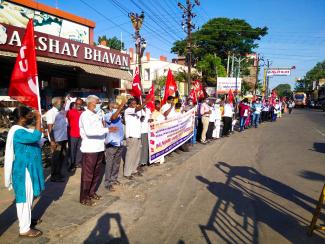Workers Resistance - Snippets for September 2021
Challenge to Employees Pension (Amendment) Scheme, 2014 Referred to 3-judge Bench of Supreme Court
The Employees Provident Fund Organisation approached the Supreme Court in a batch of appeals against the various High Court orders quashing the Employees Pension (Amendment) Scheme, 2014. In September 2014, the EPFO had made two amendments to the EPS wherein the wage ceiling was raised from Rs. 6,500 to Rs. 15,000 and had also deleted the provision of unlimited contribution for those with higher salaries than the ceiling limit. New members who joined after September 2014 and were drawing salary exceeding limit had no option to contribute at all, and those members had to exercise the option to contribute to pension on higher wages within six months from 01.09.2014. This came to be challenged before many High Courts, which then quashed the amendments. In one of the appeals from the orders of the Himachal Pradesh High Court, the Supreme court held that the “A beneficial Scheme, in our considered view, ought not to be allowed to be defeated by reference to a cut-off date, particularly, in a situation where (as in the present case) the employer had deposited 12% of the actual salary and not 12% of the ceiling limit of Rs. 5,000/- or Rs.6,500/- per month, as the case may be.”
It is in this context that the applicability of the above said judgment has been questioned leading to the 2-judge bench of the Supreme Court to refer the matter to be heard by a 3-judge bench as the above judgment was delivered by a coordinate bench of 2 judges.
The Employees Provident Fund Organization and others v. Sunil Kumar B and others - SLP(C) No.8658-8659/2019 and connected cases. [LL 2021 SC 400]
Principal Employer must remit EPF if Contractor fails
The High Court of Madras noted that the Virudhachalam Municipality of Cuddalore District, Tamil Nadu, has been entrusting civil works to contractors, self-help groups and others who outsource workers, are being deprived of welfare benefits under the Tamil Nadu Municipal Services Pension Rules, 1970, whereas the regular employees were receiving the same benefits. Since the contractors had not enrolled the outsourced workers under the scheme, they were being deprived of the benefits. Therefore, the Court directed the municipality to ensure that those of its employees who are not covered by the TNMSP Rules, are extended the benefits under the EPF Act and that as a result, the municipality as the principal employer, must ensure and verify that the contract labour engaged through contractors are paid were wages in time. The Court further observed that the municipality cannot shirk its responsibility in ensuring the remittance of dues under the EPF Act.
Commissioner, Virudhachalam Municipality vs. Secretary, Department of Ministry of Labour Employment, New Delhi and Others, 2021 LLR 770 (Mad. HC)
Cook is a Worker Covered Under Employees Compensation Act
A cook working in the hostel of Rabindra Bharati Biswabidyalaya passed away due to severe injuries during the course of his duty at the university, and the legal heirs of the worker filed a case under the Employees Compensation Act, claiming appropriate compensation. The University claimed that there was no employer-employee relationship between the university and the cook as he was hired by contractors who ran the hostel, and that therefore they had no liability in the issue. However, the Hostel Superintendent in his evidence had admitted that the accident involving the death of the cook had indeed occurred and that there was a master-servant relationship. Therefore, the High Court of Orissa came to the conclusion that the cook was a worker and is covered under the Employees Compensation Act, as also that cooking was part of manufacturing process and hence provisions of the Factories Act could be invoked. The High Court upheld that due compensation has to be paid.
Vice Chancellor, Rabindra Bharati Biswabidyalaya vs. Jagannath Patra & Another, 2021 LLR 543 (Ori. HC)
PF Rules to Change from 01.09.2021
Employers will be able to credit money in Provident Fund accounts if the UAN is linked with Aadhaar. For this, the EPFO has revised Section 142 of Code of Social Security, 2020. If Aadhaar is not linked with UAN, then not only would employers be unable to deposit the employer and employee contributions to the fund, but the beneficiaries will not be able to avail the benefits of retirement fund.
Despite Aadhaar not being mandatory by the Supreme Court, these revised changes have made it mandatory for beneficiaries to link their Aadhaar to UAN. Moreover, the Central Trade Unions have been opposed to the codification of labour laws and since this revision is in pursuance of the new Code on Social Security, 2020 it must be opposed and challenged as it deprives workers of their rightful benefits under the Employees Provident Fund Act. π

